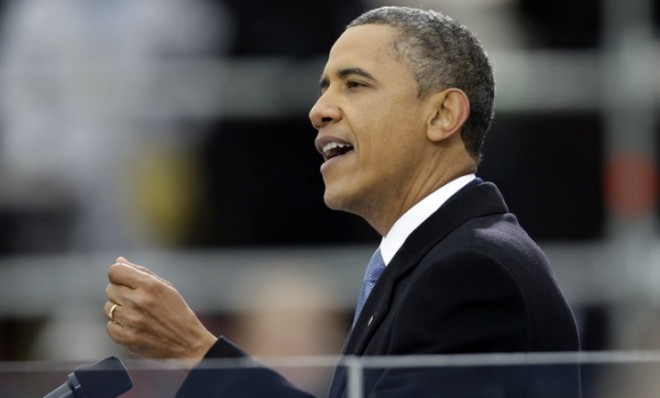Does President Obama rely on straw men to attack the GOP?
Echoing a common complaint from the Right, Paul Ryan accuses Obama of building up flimsy GOP arguments just to knock them down


One of the enduring Republican complaints about President Obama is that for all his first-term talk of bipartisanship and taking the best ideas from both sides of the aisle, the president frequently argues for his own position by dismissively painting GOP policy ideas in the worst possible light. His second inaugural, a robust defense of liberalism, was no exception, according to Rep. Paul Ryan (R-Wis.), who got an implicit (and unwelcome) shout-out from Obama when the president said that programs like Social Security, Medicare, and Medicaid "do not make us a nation of takers; they free us to take the risks that make this country great."
"No one is suggesting that what we call our earned entitlements, entitlements you pay for like payroll taxes for Medicare and Social Security, are putting you in a taker category," Ryan said on Laura Ingraham's talk radio show Tuesday. "No one suggests that whatsoever." Conservatives merely "do not want to encourage a dependency culture," and are actually trying to save the programs from "going bankrupt."
When the president does kind of a switcheroo like that, what he's trying to say is that we are maligning these programs that people have earned throughout their working lives.... So it's kind of a convenient twist of terms to try and shadowbox a straw man in order to win an argument by default.... I understand the president will continue to use straw man arguments — affix views to your political adversaries they do not have in order to try and win an argument by default.
I'm just not seeing the "straw man" here, or any "switcheroo," says Steve Benen at MSNBC's Maddow Blog. Nobody is suggesting that Social Security recipients are takers? How about Paul Ryan in 2011, when he "explicitly warned of 'a society where the net majority of Americans are takers not makers,'" a category that numerically and linguistically must include social insurance program recipients. Or Paul Ryan in 2005, when he called Social Security "a collectivist system... a welfare transfer system" championed by Ted Kennedy, Nancy Pelosi, and other "collectivist, class-warfare-breathing demagogues." It's pretty clear that "Obama doesn't need a 'straw man'; he just needs Paul Ryan to keep talking."
The Week
Escape your echo chamber. Get the facts behind the news, plus analysis from multiple perspectives.

Sign up for The Week's Free Newsletters
From our morning news briefing to a weekly Good News Newsletter, get the best of The Week delivered directly to your inbox.
From our morning news briefing to a weekly Good News Newsletter, get the best of The Week delivered directly to your inbox.
No, Ryan is right, says Michael Gerson at The Washington Post. In Monday's address, "Obama constructed a raging bonfire of straw men." Unlike Abraham Lincoln, for whom "even the gravest national crimes involved shared fault," in Obama's telling "even the most commonplace policy disagreements indicate the bad faith of his opponents." This defaming of his GOP rivals will thrill partisan supporters, who've long urged him to drop "the pious balderdash of bipartisanship," but it will prevent him from taking "a leadership role in reforms that require both parties to trust each other and take simultaneous risks."
Obama really "was unapologetic in offering an argument for his philosophical commitments and an explanation of the policies that naturally followed," says E.J. Dionne at The Washington Post. But so were Ronald Reagan and FDR in their inaugural addresses, to great effect. No doubt that some people will see Obama "as combative in his direct refutation of certain conservative ideas" — especially his calling-out of Ryan and his "radical individualism" — and argue that he "should have sought more lofty and non-partisan ground." But that's not fair to Obama, liberals, or even history. Thank goodness "neither Roosevelt nor Reagan gave in to such counsel of philosophical timidity."
For better or worse, Obama certainly didn't give a Kumbaya inaugural address, says David Frum at The Daily Beast. He gave a "damn the torpedoes" speech that rejected and repudiated the ideas espoused by Reagan and "boldly defended the social insurance state more forcefully than it has been defended by any president in my lifetime." He also called out Ryan and other opponents — and "yes, many of them deserve it" — but it was still a little jarring hearing Obama be so aggressive. I mean, trashing Republicans for "absolutism," name-calling, and relying on spectacle over policy?
Those are not words intended to invite Republican cooperation, but to slam Republican non-cooperation; not to conciliate, but to confront. They were fighting words, and they portend a second term in which the president is fully as willing to take the fight to his opponents as they have been to take the fight to him. [Daily Beast]
A free daily email with the biggest news stories of the day – and the best features from TheWeek.com
Peter has worked as a news and culture writer and editor at The Week since the site's launch in 2008. He covers politics, world affairs, religion and cultural currents. His journalism career began as a copy editor at a financial newswire and has included editorial positions at The New York Times Magazine, Facts on File, and Oregon State University.
-
 Trump’s Greenland threats overshadow Ukraine talks
Trump’s Greenland threats overshadow Ukraine talksSpeed Read The Danish prime minister said Trump’s threats should be taken seriously
-
 Why Greenland has been a US military stronghold since the Second World War
Why Greenland has been a US military stronghold since the Second World WarIn Depth American interest in acquiring Greenland is rooted in decades of military and economic strategy
-
 What would a UK deployment to Ukraine look like?
What would a UK deployment to Ukraine look like?Today's Big Question Security agreement commits British and French forces in event of ceasefire
-
 Bari Weiss’ ‘60 Minutes’ scandal is about more than one report
Bari Weiss’ ‘60 Minutes’ scandal is about more than one reportIN THE SPOTLIGHT By blocking an approved segment on a controversial prison holding US deportees in El Salvador, the editor-in-chief of CBS News has become the main story
-
 Has Zohran Mamdani shown the Democrats how to win again?
Has Zohran Mamdani shown the Democrats how to win again?Today’s Big Question New York City mayoral election touted as victory for left-wing populists but moderate centrist wins elsewhere present more complex path for Democratic Party
-
 Millions turn out for anti-Trump ‘No Kings’ rallies
Millions turn out for anti-Trump ‘No Kings’ ralliesSpeed Read An estimated 7 million people participated, 2 million more than at the first ‘No Kings’ protest in June
-
 Ghislaine Maxwell: angling for a Trump pardon
Ghislaine Maxwell: angling for a Trump pardonTalking Point Convicted sex trafficker's testimony could shed new light on president's links to Jeffrey Epstein
-
 The last words and final moments of 40 presidents
The last words and final moments of 40 presidentsThe Explainer Some are eloquent quotes worthy of the holders of the highest office in the nation, and others... aren't
-
 The JFK files: the truth at last?
The JFK files: the truth at last?In The Spotlight More than 64,000 previously classified documents relating the 1963 assassination of John F. Kennedy have been released by the Trump administration
-
 'Seriously, not literally': how should the world take Donald Trump?
'Seriously, not literally': how should the world take Donald Trump?Today's big question White House rhetoric and reality look likely to become increasingly blurred
-
 Will Trump's 'madman' strategy pay off?
Will Trump's 'madman' strategy pay off?Today's Big Question Incoming US president likes to seem unpredictable but, this time round, world leaders could be wise to his playbook
